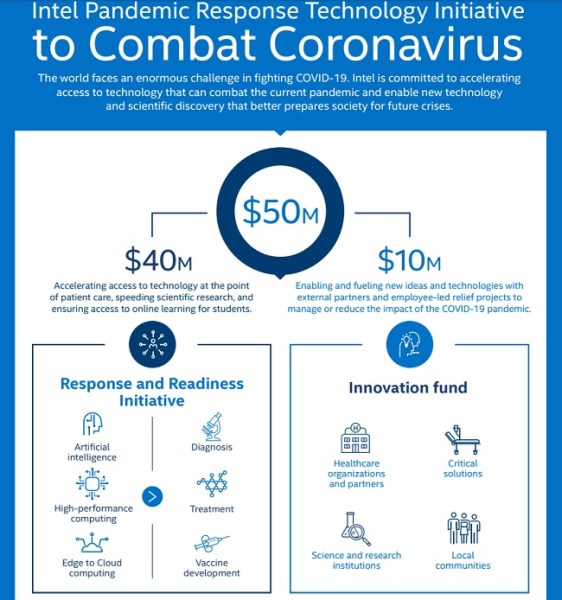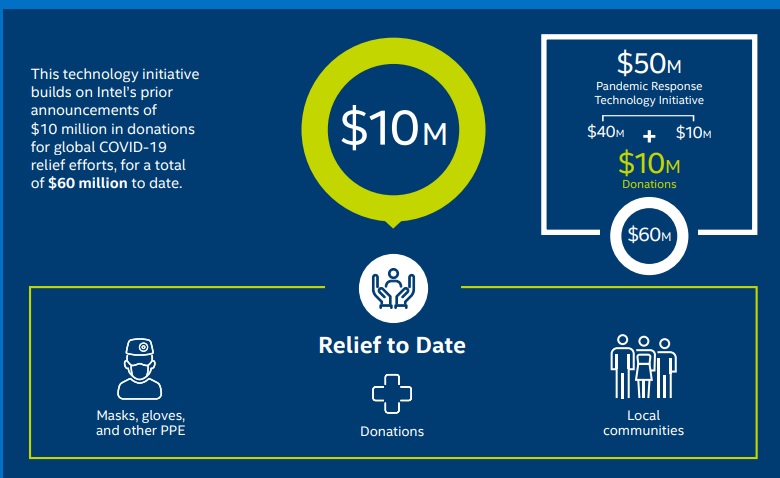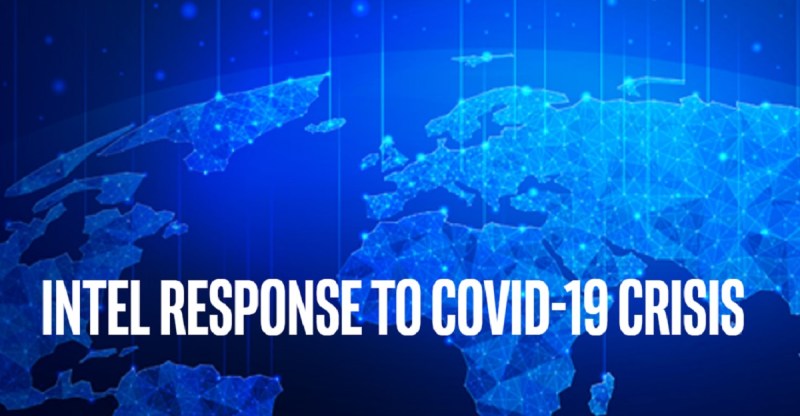Intel said it is pledging $50 million in additional cash and resources to fight the global COVID-19 pandemic. The company will focus on accelerating access to technology for patient care, scientific research, and online learning.
Included in Intel’s effort is a $10 million innovation fund that will go where access to Intel expertise and resources can have an immediate impact. This is in addition to Intel’s prior announcement of $10 million in donations to support local communities.
“The world is facing a pretty enormous challenge fighting COVID-19,” said Intel executive vice president Gregory Bryant in an interview with VentureBeat. “This is our commitment to helping accelerate technology that can combat the current pandemic. That’s a big part of what we’re going to talk about, but we will also work with our partners enabling new technology, new scientific discovery, that also helps prepare society for future crises.”
What Intel is funding

Above: Intel is putting $50 million into the coronavirus fight.
Intel will put about $40 million into COVID-19 response and readiness and online learning initiatives. The Intel COVID-19 Response and Readiness Initiative will provide funding to accelerate customer and partner advances in diagnosis, treatment, and vaccine development by leveraging technologies such as artificial intelligence, high-performance computing, and edge-to-cloud service delivery.
June 5th: The AI Audit in NYC
Join us next week in NYC to engage with top executive leaders, delving into strategies for auditing AI models to ensure fairness, optimal performance, and ethical compliance across diverse organizations. Secure your attendance for this exclusive invite-only event.
Through the initiative, Intel will help health care and life science manufacturers increase the availability of technology and solutions used by hospitals to diagnose and treat COVID-19. It will also support the creation of industry alliances that accelerate worldwide capacity, capability, and policy to respond to this and future pandemics.
“Our technology underpins a lot of the critical products and services that communities, governments, health care organizations, and enterprises depend on every day to do their critical work,” Bryant said. “We can harness that expertise. We have our resources, our technology, our talent all working with all those partners to solve some of the world’s greatest challenges.”

Above: Intel has already donated $10 million to fight the coronavirus.
The Intel Online Learning Initiative will support education-focused nonprofit organizations and business partners to work with students without access to technology, providing them with devices and online learning resources. In partnership with local school districts, the initiative will enable PC donations, online virtual resources, study-at-home guides, and device connectivity assistance. The online learning is being kickstarted with a $5 million contribution to Firstbook.org to fund 10,000 devices for underserved communities.
The initiative will kick off immediately in regions with the highest need across the United States and scale globally. The company has also allocated up to $10 million for an innovation fund that supports requests from external partners and employee-led relief projects addressing critical needs in their communities.
“If you think of this as a way that we can support innovation through all of our partners, in a broad sense, this could involve customers, it could be end-user companies, it could be software companies, it could be AI companies, it could be medical companies. Our partners can come to us with ideas that they have to help fight this virus and prepare for the future as well,” Bryant said.
Intel has some projects underway already, for example:
- Working with India’s Council of Scientific and Industrial Research and International Institute of Information Technology, Hyderabad to deploy Intel client and server solutions to achieve faster and less expensive COVID-19 testing and coronavirus genome sequencing to understand epidemiology and AI-based risk stratification for patients with comorbidities. Intel is also collaborating with India’s National Association of Software and Service Companies to build an application ecosystem and multi-cloud backend to enable population scale Covid-19 diagnostics, predict outbreaks, and facilitate medical care management and administration.
- Medical Informatics’ Sickbay, powered by Intel and Cisco technology, can turn beds into virtual ICU beds in minutes, help protect critical care workers, and expand their care capacity significantly. Weeks ago, Houston Methodist Hospital turned to Sickbay for its COVID-19 patients, enabling their providers to monitor patients virtually without risking exposure in their ICU rooms.
- In the United Kingdom, Intel is working with Dyson and medical consultancy firm TTP to supply FPGAs for CoVent, a new ventilator specifically designed in response to the U.K. government’s request for help. The ventilator is pending regulatory approval and is designed to be bed-mounted.
“It’s a solution for a hospital bed with a lot of information and intelligence, making it almost like a smart bed and kind of a virtual ICU,” Bryant said of the Sickbay effort. “It enables doctors and nurses to get data on what’s happening in that bedroom.”
Why it matters

Above: Intel is donating more than $50 million to fight the coronavirus.
Coronavirus relief to date: The technology response initiative builds on Intel’s prior announcements of $10 million in donations supporting local communities. Those donations include 1 million gloves, masks, and other equipment for health care workers; $6 million from the Intel Foundation for relief efforts in local communities; and $4 million from Intel and its subsidiaries around the globe.
Additional technology efforts: As previously announced, Intel and Lenovo have teamed up with Beijing-based BGI Genomics to accelerate the analysis of genomic characteristics of COVID-19. Intel has also joined the global XPRIZE Pandemic Alliance, along with other companies, to fuel collaboration on solutions to effectively address the immediate needs of the crisis.
“It’s all about accelerating access to technology, which is more critical than ever,” Bryant said. “We’re going to do that at the point of patient care. We’re going to work to speed scientific research. We’re going to work to increase access to online learning for students and teachers. And we’re including in the effort an additional innovation fund, which is really intended to fuel new ideas and technologies to help reduce the impact of global pandemics in the future.”


